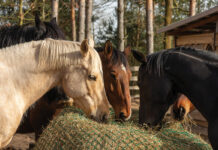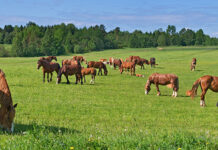
iStock/Thinkstock
What Horses Are At Risk?
The main cause of choke in horses is a lump of poorly chewed food, though horses can choke on non-food items as well. These objects are typically rocks or some other item a horse samples, or could be wood if a horse is a cribber.
Horses that bolt their feed are more at risk for choke. Additionally, older horses that have bad (or no) teeth are also at higher risk for choke as they have a harder time chewing their food properly.
Certain types of feed also increase the risk of choke. Pelleted feeds in particular can cause a horse to choke as they are compressed during the processing of the feed, then expand when exposed to moisture, like saliva.
How To Diagnose Choke
While not all chokes present the same way, some indications that your horse may be choking include:
- standing with his neck held straight out and down
- repeatedly trying to swallow (the horse might seem like he is gagging)
- drooling
- saliva and/or food or grass coming out of the horse’s nose
- coughing
How Choke Is Handled
No matter what, choke is a veterinary emergency. While you’re waiting for your vet, if you’re comfortable doing so, you can sedate your horse to try to get him to relax. Sometimes the sedation alone will allow your horse to relax enough that the mass will pass. Once your vet arrives, she will administer antispasmodic medicine to try to get his esophageal muscles to relax. If this does not work, she will pass a tube through your horse’s nose until it hits the obstruction. She will them pour warm water into the tube and empty it repeatedly as she tries to gently push down the mass. The goal is to soften the mass with enough liquid to allow it to pass into the stomach. If your vet is unable to get the mass to pass manually, your horse may need surgical removal of the obstruction.
Once your vet gets the mass to pass, which may take quite a bit of time, you will most likely be advised to not let the horse eat for 24 hours. This time allows the throat to rest and begin healing from the trauma of the lodged mass. Once your horse can eat again, he will most likely need to eat food that has been softened with water before transitioning back to dry food in a few days.
Your vet will administer pain medications to your horse to alleviate the inflammation from where your horse had the obstruction. Choking horses are also at risk of developing pneumonia, so your vet may opt to place your horse on a round of broad-spectrum antibiotics.
Reasons Why Horses Choke
Horses can choke for a variety of reasons, but some of the most common are:
- anxious about grain meals (there are also many causes of this, but it could be related to having had food withheld from him in the past, being low in the pecking order, etc.)
- not enough saliva
- poor dentition
- complications from EPM (where muscles surrounding the larynx may not work as well and allow food to get trapped
- injury to the esophagus (either from trauma or a tumor)
How To Prevent Choke
There are certain things that can be done to prevent choke. These include:
- getting your horse’s teeth checks at least twice a year, more if he is older or having issues
- feeding a non-pelletized feed
- using a slow feeder for grain meals or drop some large, smooth stones in his bucket if he bolts his feed
- adding water to his meals to make them more moist
- feeding more grain meals so he is not as anxious to bolt feed
- feeding hay first so he is not as hungry when his grain comes
- separating him to eat if he is fed in a herd and bolts his feed
- having water available to him when he eats grain meals
About the Author: Sarah Coleman has a soft spot for chestnuts with chrome, including her off-the-track Thoroughbred that she competes in the hunters. Based in Lexington, Ky., she is the Director of Education and Development for New Vocations Racehorse Adoption Program.






great info! i see this rarely talked about but it does happen and it is serious. excellent article.
I had a young horse chock on a dry corn cob.
good information.
Informative. My vet said a horse can choke for days. Mine chocked on an apple. He said apples and carrots are more likely to need surgery because they don’t soften when they flush with water.
I had a gelding choke on a commercial product meant to clear sand from his digestive system. The little pellets swelled up in his throat & caused him to choke. My vet spent many hours that evening try to clear it to no avail. The next morning as I was getting ready to load him to take him to an equine hospital, it cleared seemingly on its own. Major relief to my gelding & me!!
If pelleted feed is not good, why do they make senior feeds in that form?
I have a senior horse. She has trouble with even second cut hay. I soak hay pellets and beet pulp pellets in warm water for her.
when they say so may pounds per 100 lbs of body weight, do they mean dry weight or wet?